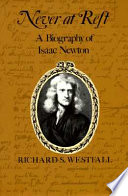 | Alfred Rupert Hall - Biography & Autobiography - 2002 - 358 pages
...short monograph on chemical forces and their operation in chemical reactions, beginning with the words: Have not the small Particles of Bodies certain Powers,...upon one another for producing a great Part of the Phaenomena of Nature? For it's well known, that Bodies act one upon another by the Attractions of Gravity,... | |
 | I. Bernard Cohen - Biography & Autobiography - 1980 - 428 pages
...their MS drafts or versions. These are in the form of negative rhetorical questions, such as (qu. 3I): 'Have not the small Particles of Bodies certain Powers,...Virtues, or Forces, by which they act at a distance . . .? 17 That is, they are not developed in the Newtonian style of the Principia. 18 The association... | |
 | Stephen Edelston Toulmin, Stephen Toulmin, June Goodfield - History - 1982 - 422 pages
...Might there not be similar short-range forces, which normally acted only at inter-atomic distances? Have not the small Particles of Bodies certain Powers,...act at a distance, not only upon the Rays of Light [ie light-corpuscles] for reflecting, refracting and inflecting them, but also upon one another for... | |
 | Richard S. Westfall - Biography & Autobiography - 1983 - 934 pages
...conviction that its phenomena require the presence offorces between particles for their explanation. Have not the small Particles of Bodies certain Powers,...upon one another for producing a great Part of the Phaenomena of Nature? For it's well known, that Bodies act one upon another by the Attractions of Gravity,... | |
 | Marcia Sweet Stayer - Biography & Autobiography - 1988 - 152 pages
...introduced a lengthy discussion in which Newton surveyed the whole range of the forces of nature. He began: "Have not the small Particles of Bodies certain Powers,...producing a great Part of the Phenomena of Nature?" He then went on to discuss chemical reactions, surface tension phenomena, and the cohesion of solids,... | |
 | Peter Michael Harman, Alan E. Shapiro - Biography & Autobiography - 2002 - 552 pages
...interpreting them as a description of the action of the non-material forces and spirits which inform them: Have not the small particles of bodies certain powers,...producing a great part of the phenomena of nature? 37 The last clause might not refer only to chemical, electric and magnetic action. I see no evidence... | |
 | Richard S. Westfall - Biography & Autobiography - 1994 - 356 pages
...conviction that its phenomena require the presence of forces between particles for their explanation. Have not the small Particles of Bodies certain Powers,...upon one another for producing a great Part of the Phaenomena of Nature? For it's well known, that Bodies act one upon another by the Attractions of Gravity,... | |
 | Thomas Levenson - Science - 1995 - 358 pages
...that can act upon one another by means of he knew not what. By 1704, Newton would ask publicly, in Opticks: "Have not the small particles of Bodies certain...act at a distance, not only upon the rays of light . . . but also upon one another for producing a great part of the Phaenomena of Nature?" In his discussion... | |
 | A. Rupert Hall - Biography & Autobiography - 2002 - 324 pages
...for a discursive and non-mathematical treatment in these Queries. The locus classicus is Query 31: Have not the small Particles of Bodies certain Powers,...upon one another for producing a great Part of the Phaenomena of Nature? For it's well known, that Bodies act one upon another by the Attractions of Gravity,... | |
 | Noam Chomsky - Business & Economics - 1996 - 264 pages
...though elsewhere he did entertain the unwelcome possibility that 'small particles of bodies' might have 'certain powers, virtues or forces, by which they act at a distance', absurd as it seems. To the end of his life Newton sought some escape from the dilemma. Mature Newtonian... | |
| |